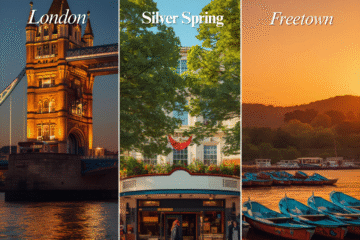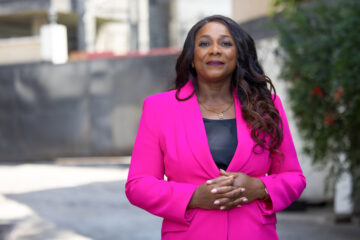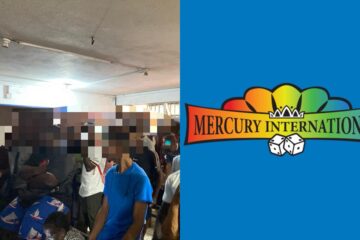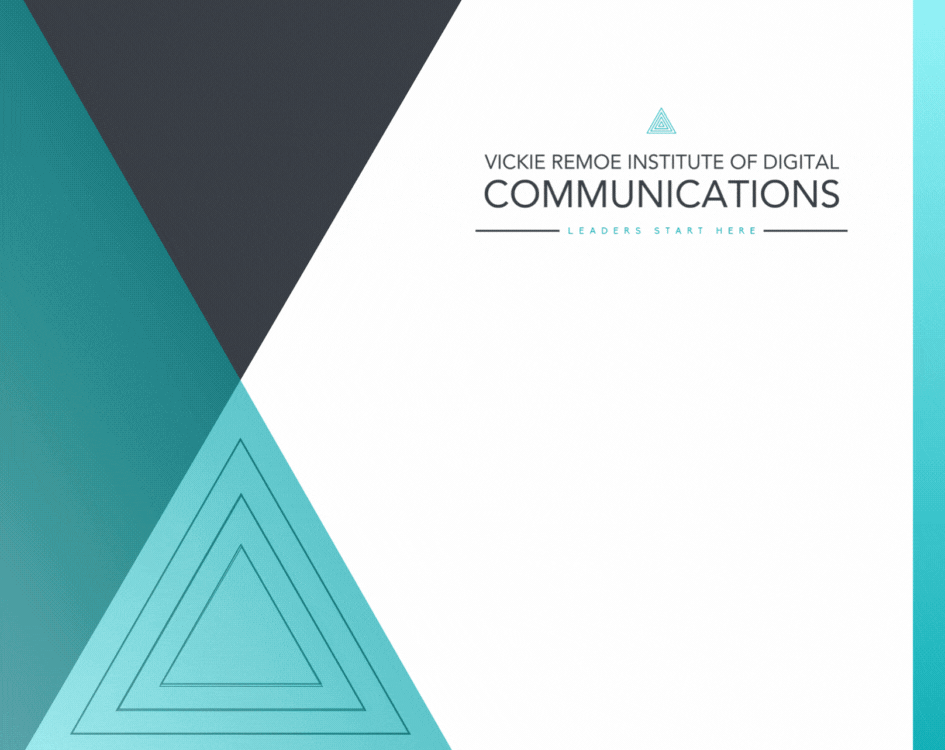
The entertainment game has shifted. If you’re an African artist, creator, or entrepreneur, waiting for a big break is no longer an option. Success belongs to those who take control: those who build strong brands, master digital platforms, and create strategic partnerships. But what does it take to stand out and attract global opportunities?
Jemilah Alghali, a proud Sierra Leonean-American and Brand and Strategy Marketing Manager at BET Media Group, has spent nearly a decade shaping narratives and leading high-impact campaigns for some of the biggest names in Black entertainment. Since joining BET in 2019, she has worked across BET and VH1 on award-winning campaigns for the BET Awards, Love & Hip Hop Miami, and NAACP Image Awards.
She spearheaded the marketing efforts of BET’s 2024 Battle of Jollof and played a key role in promoting BET’s first-ever South African series, Pound 4 Pound. In 2023, she led BET’s local market plan, driving 779K impressions. Her expertise extends to major franchises. She played a crucial role in the execution of Basketball Wives, resulting in a 16% ratings boost, and developed the whole strategy for Season 5 of Tyler Perry’s The Oval.
With a track record of delivering impactful marketing strategies and brand positioning, she knows how to capture the right audience, secure major brand collaborations, and stay relevant in an ever-evolving industry.
In this exclusive interview, Jemilah shares key insights on entertainment branding in 2025, the biggest mistakes artists make, and the exact strategies African entertainers need to expand their reach.
If you are serious about elevating your brand in 2025, take notes!
Jemilah is dropping gems!

Jemilah Alghali
What inspired you to pursue a marketing and brand strategy career? Was there a defining moment that set you on this path?
Honestly, marketing chose me before I even realized it. I knew early in life that being persuasive is key in navigating through life – people need to feel confident in what you’re saying or doing. Have you ever tried convincing African parents that a mass communications degree can be as lucrative as nursing or law? That’s branding 101.
Early in my career, I realized storytelling isn’t just for movies—brands tell stories too. I started wanting a PR career and interned and eventually worked with a few PR agencies. I fell in love with the idea that a well-crafted campaign could stir people’s emotions and drive them to take action.
Can you walk us through your career journey? What were some of the key roles that led you to your current position at BET?
Whew! Okay, let’s take a trip. While earning my bachelor’s from Lincoln University (HBCU love!) I would volunteer and eventually intern with Publicist Nikkia McClain. She was a fantastic boss and mentor, and after graduating, I went on to work with her full-time. While this was happening, it was clear to me that I was passionate about entertainment, specifically the world of global Black entertainment.
Shortly after this, I joined the Women in Entertainment Empowerment Network (WEEN) Academy – a 4-week crash course for young women on the business of Entertainment. It was intense, but I once again received invaluable mentorship from real OG’s in the game and began developing my network (which is SO important!)
After WEEN, while on the job hunt, my supportive mom put me on to this lady, Vickie Remoe. I was in awe of not only her expertise but also her bold and daring personality. Eventually, I offered my services virtually as an intern since she was based in Ghana and I was in New Jersey. I was willing and ready to take an unpaid position if it meant I’d have access to her vast insights on working in Entertainment on the African continent. Together, we led PR & Marketing for various businesses across Sierra Leone & Ghana, and she has and continues to be a mentor and friend.
About a year later, I discovered an opening at BET through the WEEN leaders’ job postings. I applied, and the rest is history. I’ve been with BET Media Group for almost 6 years, and in my time here, I’ve worked on dozens of campaigns for BET, BET+, and VH1 while earning my masters in Digital Advertising from Syracuse University.

Jemilah Alghali (far left) and some guests during a promotional event for Pound 4 Pound
The entertainment industry in Africa has grown significantly over the years. From your perspective, what are some of the most significant shifts shaping the industry today?
The game has changed. Number one is that artists no longer need anything from the traditional gatekeepers. A hit song made in Lagos today can be trending on TikTok by tomorrow. Social Media has made all content more accessible than ever.
Also, African entertainers are not just musicians or actors but businessmen and women. They’re collaborating with Burberry and Calvin Klein and buying stakes in professional soccer clubs! Brands are now seeing Africa as a majorly influential cultural and economic force. People care about what Africans have going on on the continent and in the diaspora.
With all these shifts, I need African leaders to figure out how to make digital monetization work across the continent. Our rising creators are missing out on a LOT of money.
How should African entertainers be thinking about their brands in 2025? What are some key strategies they should implement?
In 2025, African entertainers need to think beyond their next song or role or whatever—they need to think, “legacy.” Your personal brand is important, and it should not change with every launch. You are more than your talent and you have to stand for something. The more intentional and consistent you are about your story, the stronger your brand.
Next I’d say diversify your revenue streams. Look at Rihanna, a billionaire who we first met as an artist. She hasn’t dropped an album in years but is more relevant now than ever.
And then of course there’s the need to invest in your digital presence. This is something that I myself am working on! A strong and steady presence online brings more business for a multitude of reasons. It’s important to be authentic though – people don’t want to waste time with fluff, and you’re already at the mercy of algorithms.
Many entertainers want to partner with major brands. What can they do to grab the attention of brands and secure meaningful collaborations?
In my experience, big brands are looking for authentic and valuable partnerships. Number one is you need a clear personal brand. If no one can describe what makes you unique, or I have to scroll endlessly to figure out your brand, that’s a problem.
Engage with your audience, but please don’t overwhelm us. Brands want to partner with someone who has an active and engaged following, not just high numbers. If your audience listens when you speak, brands will, too.
The last thing I’ll say is don’t wait for brands to come calling—you need to be pitching yourself! I learned about the power of the pitch when working in PR. Some brands don’t even know you exist, so put yourself out there and keep their “bottom line” in mind when creating your pitch.
Is there a specific formula or approach that makes entertainers more appealing to sponsors or advertisers?
In my line of work, we partner with various talents. The key questions I ask myself when ideating on talent to engage with are:
- Is this person’s brand safe? Would partnering with them harm my brand or organization in any way, now or in the future?
- Is the person culturally relevant? Do they have influence in the space(s) my brand wants to tap into? Are they just popular, or do they drive conversation and (most importantly) action?
- Are they consistent or just trendy? Would this be a one-off partnership, or can I explore a long-term partnership here? (Trendy isn’t bad!)
What common branding mistakes do you see artists making, and how can they fix them?
Ignoring the business side. You should see your brand as a business that will be around even after you’re dead and gone, not just vibes (Fela, Michael Jackson, and Bob Marley still have very active estates and businesses.) Work on building an experienced team that can handle your branding, PR, and partnerships professionally.
And then there’s the lack of storytelling – people connect with stories. If all you post is promo content, people will disengage. Show them the journey.
What are some of the top branding and PR trends you see picking up in 2025 that entertainers should pay attention to?
In no specific order:
- Understand and stay up-to-date on the tech trends in your industry. CGI, Artificial Intelligence, and Virtual Reality can all help you create new opportunities for your brand and simplify your workflow.
- Make authenticity a top priority. People don’t always want a highly curated experience – the world relates to real life and shared experiences. Also, somebody somewhere is fascinated by your work – don’t be afraid to take people behind the scenes.
- Artists and creators will continue to cut out the middleman and use platforms like Substack and Patreon. There, they can build membership communities that make money beyond traditional streaming and give their fans content directly with creative freedom. I don’t foresee this trend going away anytime soon.
In your experience, what separates entertainers who build strong, lasting brands from those who struggle with visibility?
Longevity isn’t about talent alone. Aligning with the right people and brands, engaging with fans and making them feel like family, and consistently reinventing yourself without losing your core brand identity are key.
Press coverage is key to visibility. What’s the best way for entertainers to reach out to media platforms to secure press and interviews?
PR 101 is this: Build genuine relationships, don’t just pitch. Writers are people too, and they remember people who engage outside of press needs.
Then, you need to have a strong hook that drives urgency—why should they cover you right now? Tie your story to trending conversations, and know what’s happening within the brand or organization, and leverage it. Have they won any awards lately that you can congratulate them on? Did they get a new CEO? Show that you know.
And don’t be afraid to share your social proof. To strengthen your pitch, you can share previous press coverage from similar platforms, high engagement on posts, or important achievements or recognitions.
What advice would you give African entertainers who want to expand their reach and become global stars?
- Think global, but stay rooted in who you are. The world wants to experience authentic African culture, so don’t water it down (Americanize, Nigerianize, Ghanaianize, or South Africanize) for any reason. Art is a universal language.
- Leverage the global Black diaspora. Nobody does word-of-mouth like we do, and we’re finally starting to see ourselves as a united community despite the Diaspora Wars propaganda online. We are rooting for everybody, Black!
- Don’t rush for the “big” moves, especially if they aren’t aligned with your core brand. Move strategically, and build a long-term game plan you revisit regularly with your team.










